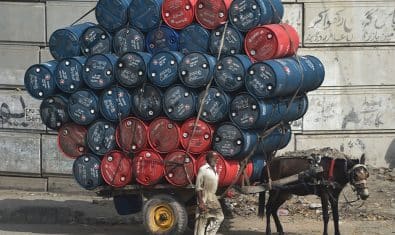Pakistan’s current electricity and energy crisis stems from structural inadequacies, and prioritization of short-term relief blinding remedial measures for the root causes, agreed energy sector experts at seminar titled “From Conundrum to Catastrophe: Understanding the Dynamics of Electricity Price Increase”.
The seminar was organized by Sustainable Development Policy Institute (SDPI) and Pakistan Renewable Energy Coalition here today to deliberate solutions for the energy pricing crisis in the country.
Speaking at the session, Dr Khaqan Najeeb, stressed on addressing immediate challenges and supplementing the core challenges in the energy sector with long-term policies. He stressed that utilizing indigenous gas resources could help stabilize energy prices as a medium-term solution. He further stressed re-profiling Pakistan’s public debt, including debts related to Independent Power Producers (IPPs) to address IMF demands and involving experts in negotiations and policy formation.
Dr Khalid Waleed, Research Fellow SDPI, highlighted that 0ver 45% of electricity goes to residential needs, highlighting high consumption for unproductive tasks and stressed boosting the share of industries for efficient power usage.
He said that balancing the shock of current electricity price hikes demands a holistic strategy which must include timely meter readings, granting targeted subsidies through BISP and removing subsidies, and Demand-side management including and simplifying government charges in bills. He stressed on accelerating clean energy transition and Just Energy Transition Partnerships, addressing transmission system inadequacies, cultivating responsible consumption behavior and integrated policy approaches as long-term solutions.
Sadia Dada, Chief Marketing and Communications Officer, K-Electric remarked that subsidies in electricity have significantly contributed to the prevailing crisis and thus balancing energy prices is pivotal.
She urged that FBR should redirect tax net aim toward retailers rather than electricity consumers to alleviate the burden on low-income consumers. The focus should be on gradual subsidy reform for fiscal prudence, broadening the tax base beyond energy consumers, and targeted resource allocation as a multifaceted approach to ensure sustainable energy pricing and equitable relief for all sectors of society.
Dr. Fiaz Chaudhry, Director LUMS Energy Institute mentioned that a major reason behind Pakistan’s current energy crisis is constant capacity addition, contributing to the capacity payment crisis. He further mentioned that energy efficiency and demand-side management has been lacking in the policy landscape of Pakistan, which could have provided a short-term relief.
Osama Rizvi urged the government to adopt measures to safeguard against the global energy inflation crisis. He suggested adoption of hedging against inflationary and external shocks, expanding the country’s strategic energy storage capacity, energy import substitution and boosting refinery capacity.
Senior Research Economist PIDE, Afia Malik stressed ensuring transparency in government charges by introducing linear tariffs and taxes, allocating targeted subsidies as social protection, and phasing out cross-sectoral subsidies. In parallel, she proposed structural reforms advocating for empowering DISCOs via inclusive policies, fostering stakeholder collaboration, and bolstering financial viability of DISCOs through Stock Exchange listing.
Mustafa Amjad, Program Manager, Renewables First highlighted that the government can save Rs. 8.6 billion by optimizing energy projects. He added that strengthening collaboration between DISCOs and CPPA can ensure affordable energy. The government must also incentivize of phase-out fossil fuel energy projects and modernizing transmission to resolve the current energy pricing crisis.
Ubaid ur Rehman Zia, Lead Energy Unit, SDPI highlighted that one of the reasons behind this hike in electricity prices is the conditionality of the International Monetary Fund (IMF)’s stand-by arrangement program which calls for financial stability of the energy sector through rationalization of tariff and removal of subsidies.
However, the problem is circular in nature with challenges deep rooted in the broader energy structure of the country. There is no easy solution to this. A workable course of action for short-term relief is very critical to contain the situation in such a way that it provides relief to public and aligning relief efforts as per the IMF program.






















Oo i see, we don’t know that why the cost of electricity was increasing and what needs to be done.